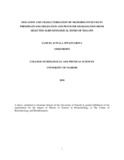| dc.description.abstract | Microbes involved in phosphate solubilising and pesticide degradation were isolated from different agro ecological zones of Malawi to solve problems of available phosphorous deficiency and xenobiotics of green revolution technologies. Phosphorous is deficient only in soluble state in tropical countries and the use of green revolution technologies like pesticides application interfere with rhizospheric microbes that help in phosphate solubilisation due to xenobiotics production. These compounds also have an impact on bio-magnification, and environment. It is therefore important to investigate synchronised strategies that will improve the utilisation of fixed phosphate in soil-plant systems and also degradation of xenobiotics using microorganisms. Extensive research done show prospect microbes for biofertilisation and bioremediation but little was known about presence of Phosphate Solubilising Microbes in Malawi. In this study microbes were isolated for solubilisation of phosphates using pikovskaya’s medium and pesticide degradation for their capacity to utilise pesticide as sole carbon source complimented by presence laccase gene. Isolates were selected based on solubilisation of inorganic tricalcium phosphate, soil and rock phosphates and also characterised for the presence of Plant Growth Promoting Traits. Biochemical test and molecular characterisation using 16S rRNA and 18S rRNA genes for bacteria and fungus respectively were used in identification. Six strains that had higher solubilisation index of 1.5 and 30 microorganisms that utilised pesticides as sole carbon source were isolated. The strains for P solubilisation were identified as Aspergillus niger, Enterococcus casseliflavus, Klebsiella pneumoniae, E. cloacae, Pseudomonas putida and Penicillium janthinellum while for degradation of pesticides Mucor irregularis, Fusarium oxysporum, Meyerozyma caribbica, Aspergillus parasiticus for fungus and genus Klebsiella, Pseudomonas, Pantoea, Bordetella and Enterobacter for bacteria. One strain of Klebsiella pneumoniae was found to degrade xenobiotics and solubilise P while other strains had PGP traits besides potential in bioremediation and biofertilisation. The study reveals new strains and shows diversity at strain level for Malawian isolates. Isolated microbes showed strong statistically significant difference in solubilising of P and the values were greater than commercial strains which indicate that indigenous microbes have high potential in solubilisation of P and degradation of xenobiotics. The study also reveals that evolutional relationships of isolated microbes are based on agro ecological zones and xenobiotics present. The study concludes that indigenous microbes have higher potential in P solubilisation and bioremediation. | en_US |

